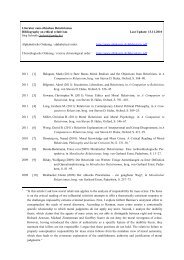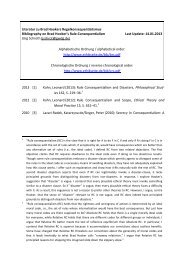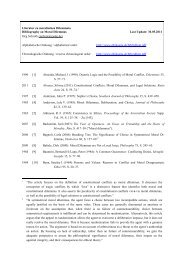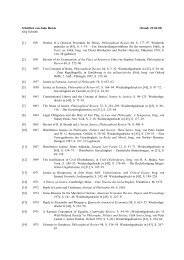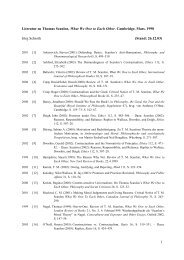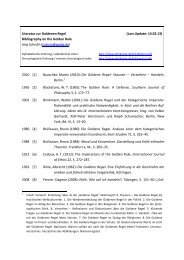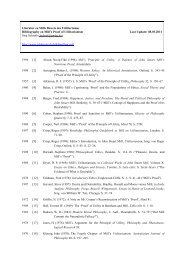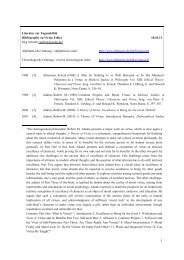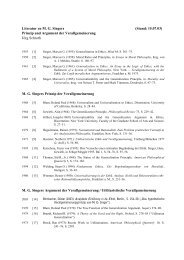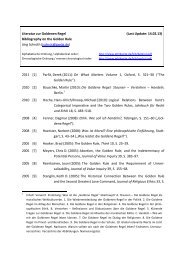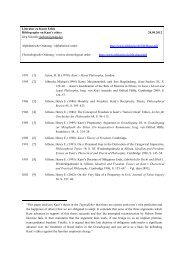Chronologische - Ethikseite
Chronologische - Ethikseite
Chronologische - Ethikseite
You also want an ePaper? Increase the reach of your titles
YUMPU automatically turns print PDFs into web optimized ePapers that Google loves.
2005 [396] Calder, Todd (2005): Kant and Degrees of Wrongness, Journal of Value Inquiry 39, S. 229–<br />
44.<br />
2005 [397] Denis, Lara (2005): Autonomy and the Highest Good, Kantian Review 10, S. 33–59.<br />
2005 [398] Forschner, Maximilian (2005): Immanuel Kant über Vernunftglaube und<br />
Handlungsmotivation, Zeitschrift für philosophische Forschung 59, S. 327–44.<br />
2005 [399] Freydberg, Bernard (2005): Imagination in Kant’s Critique of Practial Reason, Bloomington.<br />
2005 [400] Graband, Claudia (2005): Das Vermögen der Freiheit: Kants Kategorien der praktischen Vernunft,<br />
Kant-Studien 96, S. 41–65.<br />
2005 [401] Greenberg, Sean (2005): From Canon to Dialectic to Antinomy: Giving Inclinations Their<br />
Due, Inquiry 48, S. 232–48. 114<br />
2005 [402] Grenberg, Jeanine M. (2005): Kant and the Ethics of Humility. A Story of Dependence,<br />
Corruption and Virtue, Cambridge. 115<br />
2005 [403] Guyer, Paul (2005): Kant’s System of Duties, in Guyer, Kant’s System of Nature and Freedom.<br />
Selected Essays, Oxford, S. 243–74.<br />
2005 [404] Hill, Jr., Thomas E. (2005): Assessing Moral Rules: Utilitarian and Kantian Perspectives,<br />
Philosophical Issues 15, S. 158–178.<br />
2005 [405] Hills, Alison (2005): Rational Nature as the Source of Value, Kantian Review 10, S. 60–81.<br />
2005 [406] Joerden, Jan C. (2005): Über ein vermeintes Recht (des Staates) aus Menschenliebe zu foltern,<br />
in Jahrbuch für Recht und Ethik 13: Philosophia Practica Universalis. Festschrift für<br />
114 “In a recent paper, Eckart Förster challenges interpreters to explain why in the first Critique practical<br />
reason has a canon but no dialectic, whereas in the second Critique, there is not only a dialectic, but an<br />
antinomy of practical reason. In the Groundwork, Kant claims that there is a natural dialectic with respect<br />
to morality (4:405), a different claim from those advanced in the first and second Critiques. Förster's<br />
challenge may therefore be reformulated as the problem of explaining why practical reason has a canon in<br />
the first Critique, a dialectic in the Groundwork, and an antinomy in the second Critique. In this paper, I<br />
answer this challenge. I argue that these differences are due to the different aims and scope of the works,<br />
and in particular, the different place of the inclinations in their arguments.”<br />
115 “In recent years, philosophers have either ignored the virtue of humility or found it to be in need of radical<br />
redefinition. But humility is a central human virtue, and it is the purpose of this book to defend that claim<br />
from a Kantian point of view. Jeanine Grenberg argues that we can indeed speak of Aristotelian-style, but<br />
still deeply Kantian, virtuous character traits. She proposes moving from focus on action to focus on person,<br />
not leaving the former behind, but instead taking it up within a larger, more satisfying Kantian moral<br />
theory. Using examples from literature as well as philosophy, she shows that there is a Kantian virtue theory<br />
to be explored in which humility plays a central role. Her book will have a wide appeal to readers not only<br />
in Kant studies but also in theological ethics and moral psychology.”<br />
Contents: “Introduction; Part I. Kantian Virtue: 1. Dependent and corrupt rational agency; 2. Constraints on<br />
any possible Kantian account of virtue; 3. A Kantian account of virtue; Part II. A Kantian Response to<br />
Recent Accounts of Humility: 4. A Kantian response to recent accounts of humility; Part III: 5. The Kantian<br />
Virtue of Humility: 5. The Kantian virtue of humility; 6. Humility and self-respect; 7. The humble person;<br />
Part IV. The Virtues of Kantian Humility: 8. The humble pursuit of self-knowledge; 9. The humble pursuit<br />
of respect for persons; Conclusion.”



